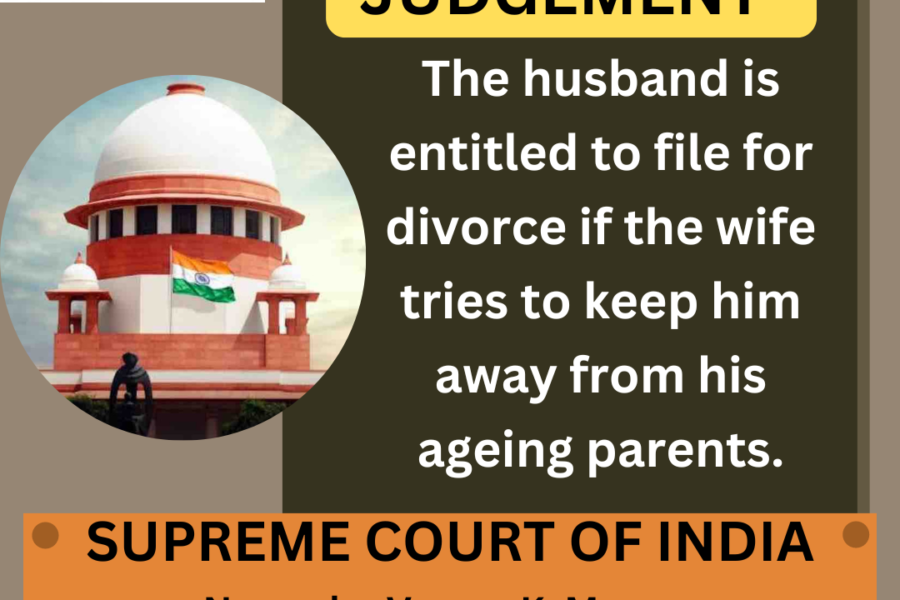Narendra Versus K. Meena
CIVIL APPEAL NO.3253 OF 2008
Background:
The respondent-wife and the appellant-husband were married in 1992, and a daughter was born to them 21 months later. The appellant filed for divorce, claiming that his wife had turned cruel due to her extreme suspicion and that she had been making serious but completely baseless accusations against him about his character and purported extramarital affair, making it impossible for him to remain with the respondent. It would also be more agonising for the appellant to remain only with the wife, given her temperament and attitude, if the respondent had wished the appellant to leave his parents for him to live independently. Based on these grounds, the petitioner claimed he was the victim of cruelty since his wife threatened to commit suicide, which she had already tried. In 2001, the family court granted divorce based on the facts established and the evidence presented. The wife, feeling wronged by the ruling, appealed to the High Court, which, by order in 2006, annulled the divorce judgment. Thus, the petitioner contested the High Court’s contested decision, which held that the appellant’s wife had not been cruel to him.
Issues:
Whether the facts make up the proper case of cruelty for divorce under Section 13(1)(i-a) of the Hindu Marriage Act, 1955?
Arguments of the Appellant:
The appellant contended that the High Court made serious mistakes in evaluating the material and rendering a decision on the appeal. The attorney presented the facts and information that the family court had gathered. He persisted in his appeal despite the wife’s allegations of an adulterous affair with a maid who never worked at their home and the neighbour’s depositions about the event in which they prevented his wife from taking her own life. He also brought up the subject of his wife leaving him because he wouldn’t live apart from his family. Based on these, the appellant contended that the Act’s Section 13(1)(ia) should be used to permit the divorce and affirm the family court’s ruling.
Arguments of the Respondent:
The bench heard the case on its merits because the respondents failed to show up on any of the dates that it was scheduled to be heard.
Judgement:
During the matter’s discussion, the bench distinguished between the two rulings and stated that the High Court gave little weight to the wife’s false allegations against the husband regarding his extramarital affair and the Respondent’s persistent efforts to force the Appellant to live apart from her family and only with her, even though the Family Court took these facts very seriously.
The court accepted the Family Court’s conclusions and rejected the High Court’s reappraisal of the evidence that the Family Court had used. The bench considered the information before making a decision. The facts and arguments made before the lower courts led the court to the conclusion that there was no justification for the suicide act. Furthermore, there could have been major problems for the husband and his family if the wife had been successful in doing so. Thus, citing the ruling in Pankaj Mahajan v. Dimple @ Kajal (2011) 12 SCC 1, the court stated that the continuous threats to commit might have resulted in grave mental cruelty.
Cruelty is the primary basis for applying for divorce under “Sec. 13(1) (i-a)” of the Hindu Marriage Act, 1955 of India, and the party bringing the petition must demonstrate that living together has become intolerable.
The court made a comparison between the ideal circumstance in Indian culture and the present circumstances, where the appellant’s wife wanted him to live apart from his parents. Stated that “In normal circumstances, a wife is expected to be with the family of the husband after the marriage. She becomes integral to and forms part of the family of the husband, and normally without any justifiable strong reason, she would never insist that her husband should get separated from the family and live only with her. If a wife attempts to deviate from the normal practice and normal custom of society, she must have some justifiable reason for that, and in this case, we do not find any justifiable reason except monetary consideration for the respondent wife. In our opinion, normally, no husband would tolerate this, and no son would like to be separated from his old parents and other family members, who are also dependent upon his income.”– Justice Anil R. Dave and Justice L. Nageswara Rao; Supreme Court of India
It is clear from the trial court’s evidence that the wife intended to have her husband split up from his family to save money. Although the High Court found it to be justified, the respondent’s claim that some money was also to be spent on her husband’s family and that it is reasonable for her to expect that her husband’s income is used for hers is unwarranted. The trial court was correct to conclude that the respondent wife’s relentless efforts to force the appellant to be separated from the family would amount to “cruelty” and that the husband would suffer greatly as a result.
The court also said that a false allegation concerning an extra-marital affair could be a cause for mental cruelty, referring to the judgement in Vijaykumar Ramchandra Bhate v. Neela Vijaykumar Bhate, 2003 (6) SCC 334.
Conclusion:
In light of the foregoing, the court concluded that the marriage ought to be dissolved by a divorce decree under Section 13(1)(ia) of the Act due to the Respondent wife’s unfounded accusations, threats, and attempt at suicide. The decision was made based on the facts and evidence surrounding the case.
Adv. Khanak Sharma (D\1710\2023)


Автор предлагает практические рекомендации, которые могут быть полезны в реальной жизни.